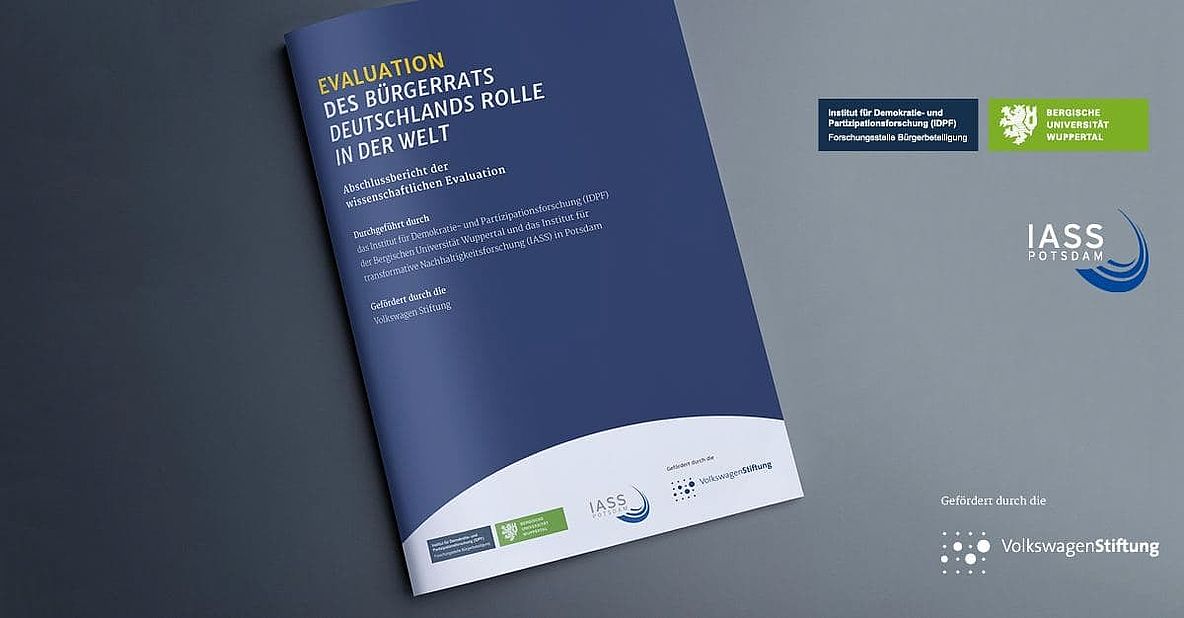Scientific evaluation confirms: Citizens' assemblies at the federal level are a useful complement to parliament

The Institute for Democracy and Participation Research (IDPF) of the University of Wuppertal and the Institute for Advanced Sustainability Studies (IASS) Potsdam today (20.5.) presented the results from the evaluation of the Citizens' Assembly "Germany's Role in the World" as well as recommendations for future Citizens' assemblies at the federal level.
The institutes, which scientifically studied the Citizens' Assembly "Germany's Role in the World" from its inception to its follow-up, conclude "that the Assembly is a suitable procedure for the cooperative and constructive participation of citizens at the federal level, provided that a number of conditions are met." Among the conditions mentioned are close ties to politics and competent specialised administrations ("institutional embedding"), the composition of participants by drawing lots and the elaboration of controversies and dilemmas ("high diversity of opinion"), the involvement of experts and affected persons who convey a topic in a generally understandable way ("appropriate involvement of expertise") and an inclusive, structuring and competent moderation in terms of content ("pronounced culture of deliberation").
Based on the collected findings, the evaluation team presents a handout for policymakers with recommendations for future citizens' assemblies. It proposes an "organisational unit for participatory democracy at the German Bundestag", which could initially take care of the implementation, quality assurance and connection of citizens' assembly procedures to the parliament. The topic should be politically relevant and explosive, whereby it is important to work out references to the lifeworld experience of the population and not to define the topic too broadly. In order to achieve the most diverse possible composition of citizens' assemblies, the "outreach sortition procedure" is recommended, with which - if necessary - less involved population groups are again specifically invited to participate. Both politics and civil society should be able to initiate citizens' assemblies. To deal with a citizens' report drawn up by sortition, the evaluation team shows various ways, from a federal printed matter to committee hearings to plenary debate.
In addition to the evaluation, the administrative law expert Prof. Dr. Jan Ziekow examined the legal framework for the implementation and institutionalisation of citizens' assemblies. According to this study, citizens' assemblies initiated by parliament could in principle be regulated as a new political instrument in the rules of procedure of the Bundestag. Citizens' assemblies initiated by the government would be possible by law or directive of the federal government. For citizens' assembly initiatives initiated by civil society, Ziekow recommends a signature hurdle of 200,000 for non-binding initiatives. According to the legal opinion, initiatives that lead to the mandatory establishment of a citizens' assembly should be anchored in the constitution and supported by 500,000 people.
+ The complete publications (evaluation. handout and legal opinion) as well as a summary media info can be found here.
Background:
The Citizens' Assembly "Germany's Role in the World" was the second nationwide sortition-based Citizens' Assembly in Germany and was under the patronage of Bundestag President Wolfgang Schäuble. It came about at the request of the Bundestag and as a direct result of the Citizens' Assembly on Democracy of 2019. It was initiated and organised by Mehr Demokratie in partnership with the initiative EsgehtLOS. It was chaired by Marianne Birthler.
At ten online events from 13 January to 20 February, around 160 citizens selected at random from the population registers drew up recommendations on how the Federal Republic of Germany should appear on the world political stage in the future. In addition to the substantive results, the aim was to gather insights into the instrument of the Citizens' Assembly as a complement to parliamentarism. The Citizens' Assembly was independently conducted and moderated by the institutes ifok, IPG and nexus. The project was funded by the Robert Bosch Foundation, Schöpflin Foundation, Foundation Mercator, ZEIT-Foundation, GLS Treuhand, Open Society Foundations, the Volkswagen Foundation (evaluation) and other private donors.